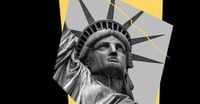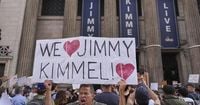On September 22, 2025, a wave of solidarity swept through Hollywood and beyond as hundreds of celebrities, artists, and public figures rallied in support of late-night host Jimmy Kimmel and the constitutional right to free speech. The American Civil Liberties Union (ACLU) spearheaded an open letter that quickly garnered over 400 signatures from some of the entertainment industry’s most recognizable names, igniting a fresh debate over government influence, corporate responsibility, and the fragile state of media freedom in the United States.
The controversy began when ABC, the network home of Jimmy Kimmel Live!, suspended Kimmel’s show indefinitely. The move came in the aftermath of a monologue in which Kimmel addressed MAGA supporters’ reactions to the murder of conservative activist Charlie Kirk—a segment that sparked outrage among certain political figures and conservative circles. According to reporting by Reuters and the ACLU, the suspension was not merely a network decision. It followed direct threats from Federal Communications Commission (FCC) Chairman Brendan Carr to affiliate broadcast license holders, a move that prompted major station groups such as Nexstar and Sinclair to pre-empt Kimmel’s program entirely.
The ACLU’s open letter minced no words in its condemnation. It declared, “Efforts by leaders to pressure artists, journalists, and companies with retaliation for their speech strike at the heart of what it means to live in a free country.” The letter went on to characterize the government’s interference as “unconstitutional and un-American,” warning that such actions represent a dark moment for freedom of speech in the nation. “Last week, Jimmy Kimmel was taken off the air after the government threatened a private company with retaliation, marking a dark moment for freedom of speech in our nation,” the letter stated.
Anthony D. Romero, executive director of the ACLU, drew a historical parallel in his remarks, likening the current situation to a modern-day McCarthy era. “If it happens to one of us, it happens to all of us,” Romero said, underscoring the ripple effect government actions can have on the broader creative and journalistic community. The letter’s signatories included a veritable who’s who of Hollywood: Jennifer Aniston, Tom Hanks, Meryl Streep, Robert De Niro, Jane Fonda, Selena Gomez, Olivia Rodrigo, Lin-Manuel Miranda, Kathryn Hahn, Maggie Gyllenhaal, Michael Keaton, Jamie Lee Curtis, and dozens more. Their collective voices lent weight and urgency to the call for action.
But the letter didn’t stop at defending the rights of entertainers. It made a point to extend its concern to a wide swath of American society. “We know this moment is bigger than us and our industry. Teachers, government employees, law firms, researchers, universities, students and so many more are also facing direct attacks on their freedom of expression,” the ACLU wrote. The letter’s inclusive message was clear: the fight for free speech is not the exclusive domain of celebrities or journalists but is a battle that touches every American, regardless of profession or political affiliation.
“Regardless of our political affiliation, or whether we engage in politics or not, we all love our country. We also share the belief that our voices should never be silenced by those in power – because if it happens to one of us, it happens to all of us,” the letter continued. The ACLU concluded with a rousing call to action: “This is the moment to defend free speech across our nation. We encourage all Americans to join us, along with the ACLU, in the fight to defend and preserve our constitutionally protected rights.”
The suspension of Jimmy Kimmel Live! and the subsequent industry response have reignited a fierce public debate over the boundaries of government power, the responsibilities of private corporations, and the limits of acceptable speech. While some argue that broadcast companies have a duty to avoid content that could incite or offend, others see the government’s pressure on private media companies as a dangerous precedent, one that could chill speech and stifle dissent across the board.
Notably, the open letter’s signatories represent a wide political and ideological spectrum, a point the ACLU emphasized in its outreach. The letter stated, “We the people must never accept government threats to our freedom of speech.” This sentiment resonated with many Americans who see the current controversy as transcending partisan lines. The letter further noted, “This runs counter to the values our nation was built upon, and our Constitution guarantees.”
Some public figures and activists have gone a step further, pledging to boycott Disney and its subsidiaries in protest of the suspension. This development adds another layer of complexity, as it places additional pressure on corporate stakeholders to clarify their positions on free expression and political influence. The boycott movement, though still in its early stages, reflects the deep frustration and anger felt by many who perceive the suspension as a capitulation to political pressure.
For their part, ABC and its parent company Disney have so far remained tight-lipped, declining to comment publicly on the specifics of the suspension. The silence has only fueled speculation and concern about the extent to which media companies are willing—or able—to resist government interference when their licenses and business relationships are on the line.
Meanwhile, the broader entertainment community has rallied behind Kimmel, with many celebrities using their platforms to amplify the ACLU’s message. Social media has been awash with the hashtag #DefendFreeSpeech, as actors, musicians, and filmmakers urge their followers to read and sign the open letter. The groundswell of support has given the campaign a momentum that few could have predicted just days earlier.
Yet, the story is not just about one television host or one network. As the ACLU’s letter points out, the stakes are much higher. In an era when teachers, researchers, students, and even law firms are facing increased scrutiny and threats of retaliation for expressing views that run afoul of those in power, the principles at play are fundamental to the nation’s identity. The letter’s authors and signatories argue that defending free expression now is essential to preserving the rights of all Americans in the future.
As the debate rages on, one thing is clear: the suspension of Jimmy Kimmel and the subsequent response have thrust the issue of free speech back into the national spotlight. Whether this moment will lead to meaningful change or simply fade into the background remains to be seen. But for now, the message from Hollywood and the ACLU is unmistakable: the fight for free speech is everyone’s fight, and it’s far from over.



